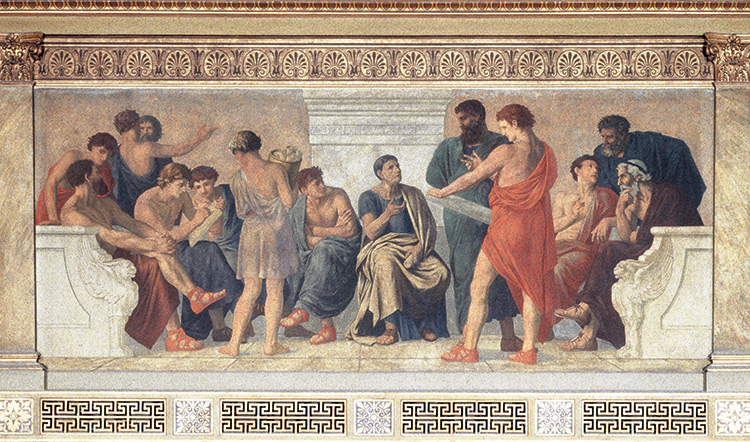Aristotle v. Parmenides: The Case of Generation
INTRODUCTION
Aristotle calls his philosophical position on form and matter: the theory of principles. In developing this position, Aristotle confronts a challenge posed by many presocratic philosophers, including Parmenides, regarding generation. In his own argument, Parmenides denies the possibility of generation, or change, whatsoever. In response, Aristotle posits that his theory of principles can answer the problem that leads to this philosophical challenge. The aim of this paper is to briefly summarize Aristotle’s Theory of Principles, explain Parmenides’ argument as well as Aristotle's response to that argument, and then conclude by considering the merits or concerns of each position. THE THEORY OF PRINCIPLES
Aristotle posits that three essential components are involved in every process of change. There is the subject, as in the thing that undergoes a change, and two opposing properties, as in attributes or qualities. These opposing properties are those with conflicting tension between them, such as hot and cold, or musical and unmusical. Aristotle argues that change occurs when the subject of such change gains more of one property while also losing its opposite property. An example of this that Aristotle offers, goes as such; when a person becomes more musical, they also become less unmusical. The same would apply to a cup of coffee that is getting colder, as it is also becoming less hot, or when a classroom becomes louder, by also becoming less quiet. Therefore, to summarize, change is the process by which a subject becomes more of one property and less of its opposing property.
ARISTOTLE: THE GENERATION OF EVERYTHING
Aristotle posits that this view can also explain generation. Aristotle argues that things are generated when ‘matter’, gains ‘form’ and loses ‘privation’. Note here that form and privation oppose each other, similar to the opposing properties in Aristotle’s view of change. For Aristotle, ‘matter’ is the physical stuff that everything is made up of, ‘form’ is the shape that matter takes to become a thing, and ‘privation’ is the absence of a particular form in matter. Together, these three components explain the generation of everything physical, according to Aristotle.
In Aristotle’s view, matter cannot exist in the world without a form. However, when matter does not have a specific form, but could eventually have that form, it then has the ‘privation’ of that form. Privation, in other words, is simply the potential of matter for having a particular form. Think of matter as being a pile of bricks, and form as being the blueprints for a house. At the moment, the matter in question has the form of a pile of bricks. Moreover, until the house is built, the bricks only have the potential to be a house, or as Aristotle would say, the privation of a house. Once the house is built, however, the form of the house combined with the matter of the bricks create a house. This is how Aristotle views generation.
A WORLD UNGENERATED
Aristotle posits that this view can also explain generation. Aristotle argues that things are generated when ‘matter’, gains ‘form’ and loses ‘privation’. Note here that form and privation oppose each other, similar to the opposing properties in Aristotle’s view of change. For Aristotle, ‘matter’ is the physical stuff that everything is made up of, ‘form’ is the shape that matter takes to become a thing, and ‘privation’ is the absence of a particular form in matter. Together, these three components explain the generation of everything physical, according to Aristotle.
In Aristotle’s view, matter cannot exist in the world without a form. However, when matter does not have a specific form, but could eventually have that form, it then has the ‘privation’ of that form. Privation, in other words, is simply the potential of matter for having a particular form. Think of matter as being a pile of bricks, and form as being the blueprints for a house. At the moment, the matter in question has the form of a pile of bricks. Moreover, until the house is built, the bricks only have the potential to be a house, or as Aristotle would say, the privation of a house. Once the house is built, however, the form of the house combined with the matter of the bricks create a house. This is how Aristotle views generation.
A WORLD UNGENERATED
Parmenides, amongst other thinkers of his time, held a different position by arguing for the logical impossibility of generation. Their argument goes as follows; everything that has ever come to be (that is everything that exists), either came from a state of existence, or it came from a state of non-existence. However, something cannot come from a state of existence, since that would mean it already existed. That is, it would be unintuitive to claim that the pile of bricks came into a state of existence, if there were a bunch of bricks lying around beforehand. Yet, something cannot come into existence from being in a state of non-existence, either. In other words, if a thing is to go from one state to another, the subject that switches states must surely exist beforehand. Since a subject cannot exist in a state of non-existence, it cannot be the case that the thing generated came from being in a state of non-existence. In such a light, generation would then seem to be a change which lacks a subject, which is impossible. To summarize this Parmenidean argument; what is does not come to exist, since it already is, yet nothing comes to exist from nothing. Therefore, since there are only two ways to explain generation, and both are impossible, then, there can be no such generation of things.
ARISTOTLE'S RESPONSE
ARISTOTLE'S RESPONSE
In response, Aristotle posits that Parmenides has confused the role of the subject in his argument. According to Aristotle, the subject of generation or change is also the generated thing in this Parmenidean reasoning. This clearly presents an issue, since something cannot be generated of itself. If something were to be generated of itself, then there would be no change at all, and thus there would not be anything generated at all. For Aristotle, however, matter is the subject of change. This allows for things to come to exist, since matter can acquire new forms. As matter gets rearranged into new shapes and structures, with potentially different purposes, new things come to be of that matter. For example, a house, which was previously in a state of non-existence, comes into a state of existence when the bricks get placed in the right order. That is, a house is generated when the matter of the house attains the form of a house.
IN DEFENSE OF PARMENIDES
IN DEFENSE OF PARMENIDES
A substantial concern that arises from Aristotle’s argument, is that by focusing on the subject of change in the Parmenidean argument, Aristotle is now committed to claiming that matter has always been in a state of existence. For, Aristotle has yet to show how matter can come into a state of existence. He has, in fact, presented a view for how new things are made from the already existing matter. Yet, Parmenides could push back against Aristotle on this, by restating his question with matter as the subject. Such a question could look like this; if matter itself is in a state of existence, did it come from being already in state of existence or from a state of non-existence? Thus, in a way, Parmenides’ argument still holds. While Parmenides may have mistaken the subject of generation, his view can be amended to still claim that matter cannot be generated. From this position, it is hard to see how Aristotle could object, and as such I do not believe that he would.
CONCLUDING REMARKS
CONCLUDING REMARKS
It would appear that the problem Aristotle faces is that he has not yet proved that new things can be generated, but rather, that the already existing things can be changed into new things. To conflate the idea of change with the idea of generation seems problematic, to say the least. Furthermore, I believe that language further confirms this concern. As far as the English language is concerned, if I were to make a house out of a pile of bricks, it would be wrong for me to say that I generated the bricks, or the house for that matter. Rather, I turned the already existing bricks into a house by placing them in the right order. Generation, by its very definition, entails creation, or at least production. Since changing matter that was already in a state of existence is not the same as creating something that was non-existent before, Aristotle has yet to provide a theory of generation. However, his view still serves as a useful theory of change.



Comments
Post a Comment